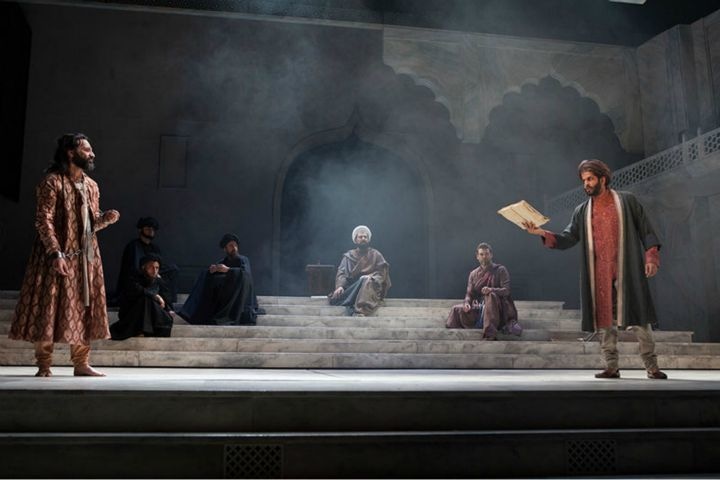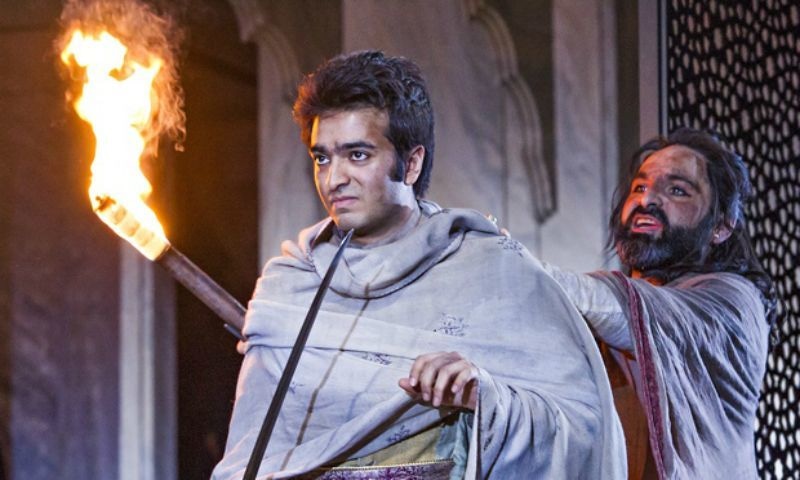Ajoka Theatre has a reputation for staging socially critical performances and Dara is one such. First performed in Pakistan, the play has now made its way to the National Theatre in London for a slot of 36 shows.
Culminating its run on April 4, Dara tells the story of Mughal Emperor Shah Jehan and his two sons Dara Shikoh and Aurangzeb who battle to succeed him after his demise. Tanya Ronder’s adaptation of Shahid Nadeem’s work spans the princes’ lives from cradle to grave, making it an intense domestic drama of global consequence – for India then and for the world now.
Read more | 'Dara': Pakistani play set to make waves at London’s National Theatre
Directed by Nadia Fall, the reception for the play has thus far been mixed. Following are some reviews that the play opened to:
Many felt that the impact was lost but the intent to convey a tale that had been itching to be told applause worthy:
"The key challenge of presenting the story of Dara and Aurangzeb to British audiences lies in fully acquainting us with its complex cast of characters, and providing sufficient historical and cultural context. Fall’s production doesn’t quite manage to keep a grip on its many disparate threads, but there’s no faulting the ambition." - Laura Barnett, The Daily Telegraph
"Sometimes the intention is more striking than the achievement. I applaud the National’s attempt to broaden its cultural base by offering us a play about Muslim culture. However, in Tanya Ronder’s free adaptation, it feels like a slightly earnest history lesson. It is clear that Shaheed Nadim’s motive in writing the play was to correct the historic imbalance by which Aurangzeb is seen as an Islamic role model and Dara as an unworldly heretic. But what in Pakistan is a brave, moral choice becomes, in Ronder’s version, a one-sided deification of Dara." - Michael Billington, The Guardian
"Performances can feel one-dimensional or forced - but then, the script frequently facilitates this by being flatly over-expositional. Granted, there is an awful lot of ground to cover as the action flits cinematically between eras. It’s a rich story, even if not all of it fully resonates here. Katrina Lindsay’s designs work beautifully - corners of marble arches evoking the architecture the Mughal empire is so famous for (the princes’ father, Shah Jahan, is the man responsible for the Taj Mahal). Plush costumes, between-scene movement and live Indian music are also all an utter delight, adding up to an elegant evocation of period and mood." - Holly Williams, The Independent
 |
| Zubin Varla and Prasanna Puwanarajah star in Dara at the National Theatre. - Photo courtesy: Official London Theatre |
And many were impressed and visually enticed.
"It’s a subtle, wise and deeply felt approach, making use of historical drama’s mix of live action and period setting to lend the issues both immediacy and perspective. Nadeem balances the spiritual and the worldly, the principled and the personal, demonstrating the grace in belief while at the same time illustrating the danger of absolutism. Tanya Ronder’s fleet adaptation keeps things moving and Nadia Fall’s beautiful, silken production balances clarity and fluency, using latticed screens to melt from scene to scene." - Sarah Hemming, Financial Times
A bewitching tale of Indian history with a scintillating first half finale as good as any Shakespearean stand-off. At its heart is a rompingly good tale, a classic bro on bro fight for a crown. Throw in a bit of history – I’ll admit this is a time and place of which my knowledge is sadly lacking – two sensational central performances and a thick seam of religious interpretation and understanding, and you’ve got a cracking production." - Matthew Amer, Official London Theatre
"This is a complicated story, and the play works best when it dares to revel in the complexity of the arguments it is putting forward. The best scene by far – and one it’s easy to imagine will be studied in schools – is when Dara is brought before the Sharia court in Delhi, and is forced to prove that he is a true Muslim. There are some flaws. It occasionally becomes irritating that the background to Aurangzeb’s vengeful interpretation of Islam plays purely like the stuff of a misery memoir. That cavil aside, it is a magnificently ambitious project, beautifully acted, and visually sumptuous, that throws both light and darkness on a crucial moment in world history." - Rachel Halliburton, Time Out
It is fairly evident that showcasing something that is so entrenched in our history but alien to the audiences abroad is not an easy task. However, with a stellar story, multi-racial cast and vivid production, Dara is getting applause for its ambition and making it hard for people to find fault with it.












































